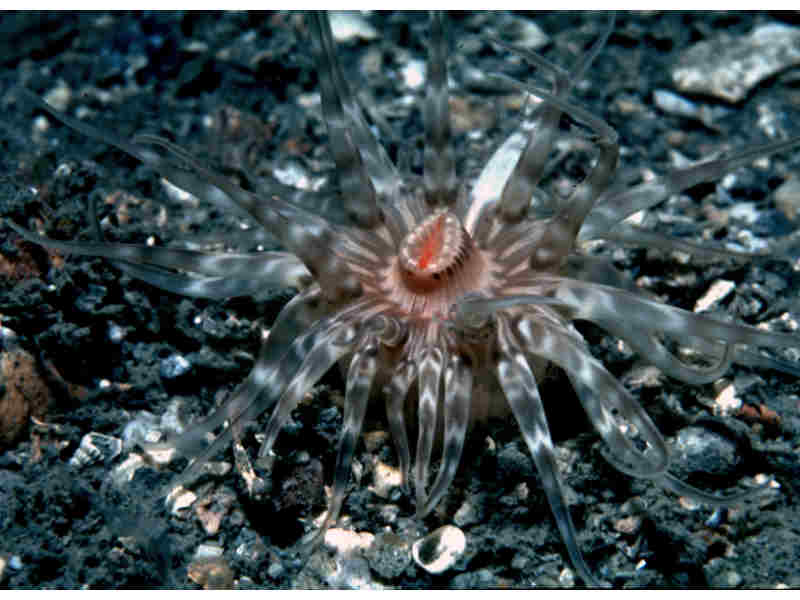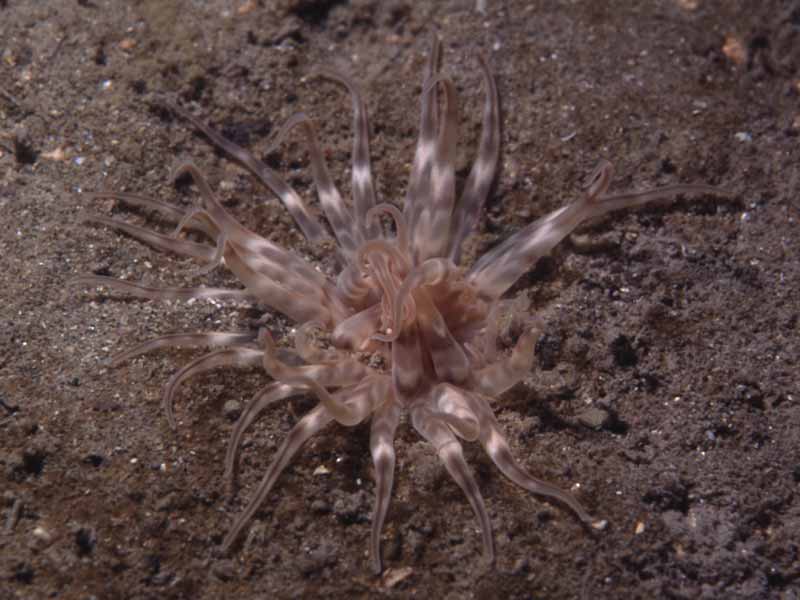Burrowing anemone (Mesacmaea mitchellii)
Distribution data supplied by the Ocean Biodiversity Information System (OBIS). To interrogate UK data visit the NBN Atlas.Map Help
| Researched by | Frances Peckett & Dr Samantha Garrard | Refereed by | This information is not refereed |
| Authority | (Gosse, 1853) | ||
| Other common names | - | Synonyms | Ilyanthus mitchelli , Mesacmaea mitchelli |
Summary
Description
Mesacmaea mitchellii is a burrowing anemone with only the disc and tentacles showing at the surface of the sediment. The column is stout, elongated and pear-shaped, 8 cm long and 5 cm in diameter. The tentacles of Mesacmaea mitchellii are very long in extension, taper to fine points, and are located at the top of the column. There are 36 tentacles in total with a primary cycle of seven tentacles held inwards over the central disc. The tentacles are a translucent greyish brown with a pattern of chevrons of brown and whitish near the base. The disc is greyish brown, cream or reddish, in colour. There is a darker ring around the mouth and broad dark radial lines amongst the tentacles bases.
Recorded distribution in Britain and Ireland
Recorded from south Devon along the south-west coast. Also recorded around Gurnsey and Jersey, north Cornwall, south-west and mid-Wales and the Irish Sea.Global distribution
Recorded from south-west Europe and the Mediterranean.Habitat
A burrowing sea anemone that occurs in sand or gravel. It is a sublittoral species found from 15-100 m.Depth range
15 - 100 mIdentifying features
- A burrowing anemone with only the disc and tentacles showing above the surface of the sediment.
- The tentacles are very long in extension and taper to fine points, they are translucent greyish brown in colour and patterned with chevrons of darker brown and whitish near the base.
- A maximum total number of 36 tentacles with 7 tentacles held inwards over the disc
- The column is stout, elongated, pear-shaped in extension and spherical in contraction, up to 8 cm long and 5 cm wide.
- The top of the column directly under the disc is a translucent grey with white markings and the part of the column above the base is fawn, brown, orange or red.
Additional information
None.Listed by
- none -
Bibliography
Manuel, R.L., 1988. British Anthozoa. Synopses of the British Fauna (New Series) (ed. D.M. Kermack & R.S.K. Barnes). The Linnean Society of London [Synopses of the British Fauna No. 18.]. DOI https://doi.org/10.1002/iroh.19810660505
Picton, B.E. & Costello, M.J., 1998. BioMar biotope viewer: a guide to marine habitats, fauna and flora of Britain and Ireland. [CD-ROM] Environmental Sciences Unit, Trinity College, Dublin.
Stephenson, T.A., 1935. The British Sea Anemones, vol. 2. London: Ray Society.
Datasets
NBN (National Biodiversity Network) Atlas. Available from: https://www.nbnatlas.org.
OBIS (Ocean Biodiversity Information System), 2025. Global map of species distribution using gridded data. Available from: Ocean Biogeographic Information System. www.iobis.org. Accessed: 2025-08-08
Citation
This review can be cited as:
Last Updated: 20/02/2007




